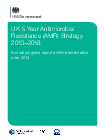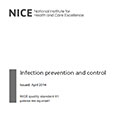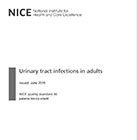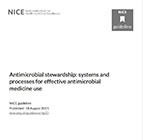
At the peak of its prominence as a political issue around a decade ago, healthcare associated infections were widely held to be responsible for thousands of deaths in the NHS. ONS data shows that on their own, the Staphylococcus Aureus and Clostridium difficile infections were cited in the death certificates of over 8600 English and Welsh NHS patients in 2006. After years of concerted effort to improve the situation including hand hygiene campaigns, hospital ‘deep cleans’ and infection prevention initiatives great strides have been taken in reducing rates of infection by these deadly organisms. Nonetheless, complacency is a deadly mistake.
Public Health England figures released in June show that the number of recorded cases of MRSA for the first quarter of 2015 are up 9% on the same period in 2014. Similarly, C. difficile infections rose by 12% between Q1 in 2014 and Q1 in 2015. These worrying trends were seemingly pre-empted by the National Institute for Health and Care Excellence (NICE) who in April 2014 were clear about the risk of letting infection control efforts slip. In unveiling Quality Standard 61, the Institute drew attention to the continuing impact of HAI; 300,000 people get an infection while being cared for within the NHS in England each year and one in 16 people being treated on the NHS picks up an infection. The document places a requirement on trusts and HCPs to redouble their infection prevention and control endeavours in six key areas.
The renewed focus on HAI needs to be seen in the wider context of the pressure on the National Health Service. Even fifteen years ago, before MRSA and C. difficile rose to full prominence the National Audit Office conservatively projected that hospital acquired infections cost the NHS £1 billion per annum. Clearly infection control lapses need to be regarded as one of the burdensome pressures on out health economy that the landmark NHS Five Year Forward View made clear needs to be tackled. The time for action to improve Infection Prevention and Control is now. This inaugural national conference will underline the economic and humanitarian cases for better infection prevention measures to be adopted and continuously improved. It will be a knowledge exchange for Infection Prevention & Control leads and champions from around the country to enhance their ability to succeed in their roles.
CONFERENCE GOALS
- To clearly articulate the business case for investment in infection prevention.
- To highlight examples of innovative and successful practice in infection prevention/control from around the world.
- To encourage the adoption of such best practice in a greater number of NHS trusts and other UK healthcare settings.






 UK 5 Year Antimicrobial
Resistance (AMR) Strategy
2013–2018
UK 5 Year Antimicrobial
Resistance (AMR) Strategy
2013–2018  UK 5 Year Antimicrobial
Resistance (AMR) Strategy
2013-2018
UK 5 Year Antimicrobial
Resistance (AMR) Strategy
2013-2018 NICE - Infection prevention and control
NICE - Infection prevention and control
 NICE - Urinary tract infections in adults
NICE - Urinary tract infections in adults
 NICE - Antimicrobial stewardship: systems and
processes for effective antimicrobial
medicine use
NICE - Antimicrobial stewardship: systems and
processes for effective antimicrobial
medicine use
 Clostridium difficile infection
objectives for NHS organisations in
2015/16 and guidance on sanction
implementation
Clostridium difficile infection
objectives for NHS organisations in
2015/16 and guidance on sanction
implementation
 Dr Nandini Shetty
Dr Nandini Shetty
 Philip Howard
Philip Howard